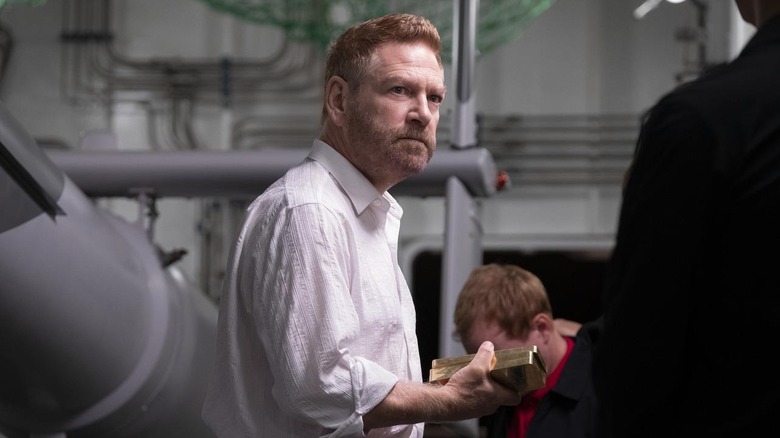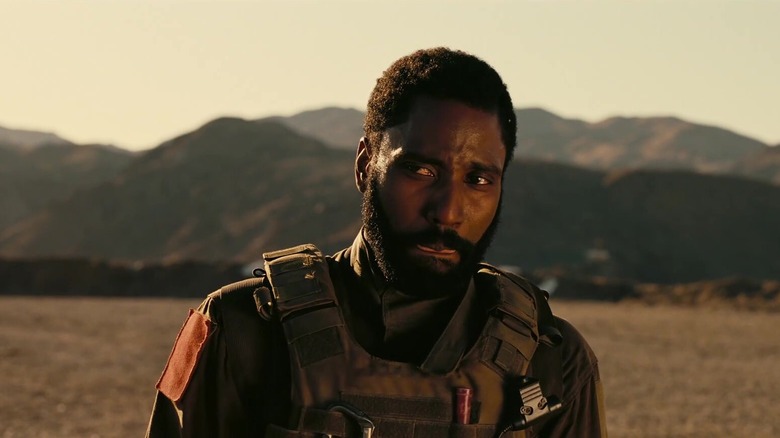5 Years Ago, Director Christopher Nolan Clashed With Warner Bros. Trying To Save The Box Office
(Welcome to Tales from the Box Office, our column that examines box office miracles, disasters, and everything in between, as well as what we can learn from them.)
"Christopher Nolan is an IP unto himself. Only a handful of directors are well known to the general public, and he is currently at the top of that list." Those are the words of box office analyst Jeff Bock speaking to Variety in 2024 about Christopher Nolan. At the time, the Oscar-winning director had just locked down a deal to bring his next movie, which we now know to be "The Odyssey," to Universal, just as he did with "Oppenheimer."
It cemented a breakup between Nolan and Warner Bros., the studio he called home for most of his career. From reinventing the "Batman" franchise with "Batman Begins" to creating one of the most successful original movies of all time with "Inception," it had been a fruitful partnership. Even so, Nolan had earned rare power as a director that he felt compelled to exercise.
In 2020, at the height of the COVID-19 pandemic, Nolan set out on a quest to save the box office, using his $205 million blockbuster sci-fi picture "Tenet" to do just that. It was the beginning of a clash between Nolan and WB that, in many ways, represented two diverging views on the future of the industry.
In this week's Tales from the Box Office, we're looking back at "Tenet" five years later. We'll go over how it became the centerpiece of Hollywood's future, what happened when it hit theaters, what happened in the aftermath of its release, how that destroyed Nolan's partnership with Warner Bros., and what we can learn from it several years removed. Let's dig in, shall we?
The movie: Tenet
The film centers on a man known only as the Protagonist (John David Washington) who, armed with only one word — Tenet — is fighting for the world's survival. Going on a journey through the world of international espionage, the mission takes him on a time-bending, globetrotting journey. The cast also includes Robert Pattinson ("Twilight"), Elizabeth Debicki ("The Crown"), and Kenneth Branagh ("Dunkirk").
"We're jumping off from the point of view of an espionage film, but we're going to a number of different places. We're crossing a few different genres in a hopefully exciting and fresh way," Nolan said of "Tenet" in a December 2019 interview. "There's no question, it's the most ambitious film we've made."
That's truly saying something, given that Nolan is the guy who previously made epic $1 billion blockbusters like "The Dark Knight." By that point, he had earned the trust of audiences around the world and, in turn, the trust of Warner Bros. They were happy to write a $200 million check for the man who made them billions at the box office over the years. The only problem is that a global pandemic didn't factor into the initial calculus.
By March 2020, theaters all around the world closed for months on end. Near-countless movies were delayed, with "Tenet" being one of them. Other movies went directly to streaming at the advent of Premium Video On Demand, such as "Trolls World Tour." Nolan, however, had no intention of letting his brainchild serve a streaming-focused future.
The industry's eyes all land on Tenet
It's easy to take for granted now, but 2020 was a calamitous time for the movie industry. Studios had no idea if the box office would ever recover. There was real concern that theaters might go extinct, with Hollywood tripling down on streaming during the dog days of the pandemic. All the while, Nolan wanted to be the one to bring big new movies back to the big screen, using "Tenet" to help get theaters back on their feet. All eyes were on Nolan, WB, and this time-bending blockbuster
Warner Bros. had a $205 million investment to protect in the short-term, and a long-term future to consider. As such, the planned July release date was pushed back indefinitely, which is said to have rubbed Nolan the wrong way. As a July 2020 report from The New York Times stated:
"Warner, concerned about its 'Tenet' investment, was leaning in favor of postponement, while Mr. Nolan, a fervent advocate for preserving the moviegoing experience, was more eager to press ahead. The discussions amounted to a fraught moment for Warner: Mr. Nolan is a proven moneymaker, and the studio wants to keep him happy."
John Stankey, the CEO of AT&T, WB's former parent company, assured later that month that "Tenet" wouldn't go directly to streaming. Eventually, a plan was hatched. The studio would roll out Nolan's film internationally during the last week of August in addition to playing it in select North American theaters before a full release over Labor Day weekend in early September.
The financial journey
After months of back and forth, "Tenet" hit theaters in the U.S. on the weekend of August 28 on just over 300 screens. Relative to most of Nolan's movies, reviews were quite mixed. That further complicated an already complex situation. This also wasn't quite the first Hollywood blockbuster to get a wide release, as Marvel's "The New Mutants" became the canary in the coal mine, opening to $7 million that weekend en route to an eventual $49 million global cume. That was a sacrificial lamb for Disney, though. WB needed much, much more from Nolan's pricey motion picture.
After making $1.7 million on weekend one, "Tenet" fully arrived on the weekend of September 4 on over 2,800 screens. It made $11.6 million, counting the Monday Labor Day holiday. Was that good? Was that bad? Hollywood's new normal made it impossible to determine. Warner Bros. was asking for a larger share of the ticket sales, north of 60%, which helped their bottom line. It certainly didn't help theaters any.
With little competition, "Tenet" was able to hold onto the top spot for weeks on end. It became the lowest-grossing number one movie in more than 30 years when it topped the charts with just $3.4 million at the end of September. Overseas, the film performed far better, crossing the $300 million mark by October. As things improved, WB re-released the film several times to help goose its grosses.
When all was said and done, "Tenet" finished its run with $59.4 million domestically to go with $306.8 million overseas for a grand total of $366.2 million worldwide.
Was Tenet a success? It's complicated
On the one hand, the film didn't even come close to breaking even theatrically. It would have needed close to $600 million globally for that to even be on the table. At the same time, that $366 million went a long way towards helping theaters in their most desperate hour, while signaling to Hollywood that there was still an appetite for theaters.
"Tenet" also faced a larger-than-usual threat from piracy, as many people were (rightfully) still not ready to return to public gatherings before Covid-19 vaccines were widely available. It's impossible to say how much that ate into potential earnings. Nolan, for his part, was clear about his feelings on the matter, saying the following in a November 2020 interview:
"I am worried that the studios are drawing the wrong conclusions from our release — that rather than looking at where the film has worked well and how that can provide them with much-needed revenue, they're looking at where it hasn't lived up to pre-COVID expectations and will start using that as an excuse to make exhibition take all the losses from the pandemic instead of getting in the game and adapting."
Nolan is the only director in history to have five straight movies make at least $500 million worldwide. "Tenet" broke that streak, but he didn't care. He was more concerned about the long-term health of the industry. Other studios, however, were hedging their bets, with Warner Bros. leading the way in that department. The studio's method of hedging enraged Nolan to the point of no return.
The final nail in the coffin for Nolan and Warner Bros.
Nolan and Warner Bros. may have butted heads over the "Tenet" release, but the director described himself as "very pleased" with the release, speaking with the AP. What Nolan wasn't pleased with was the studio's so-called "Project Popcorn." Announced in December 2020, it was revealed that WB's entire 2021 movie slate would premiere in theaters and on HBO Max the same day.
This pissed off theatre chains such as AMC, as well as filmmakers. Nolan did not mince words. Speaking a few days after the announcement, the director called out Warner Bros. very directly, taking a big shot at HBO Max. Nolan said at the time:
"Some of our industry's biggest filmmakers and most important movie stars went to bed the night before thinking they were working for the greatest movie studio and woke up to find out they were working for the worst streaming service."
When it came time for Nolan's next movie, he took his business elsewhere. At Universal, "Oppenheimer" made nearly $1 billion at the box office and won Best Picture at the Oscars. It became a full-blown phenomenon and one of the highest-grossing movies of the pandemic era. Though Nolan said the situation with Warner Bros. was "water under the bridge" in 2023, he's staying in business with Universal. WB even tried to get Nolan back, to no avail. That is all rather telling.
The lessons contained within
It would be unfair to call "Tenet" an outright financial success. It would also be unfair to discount what it did for the industry. Nolan used the might he had amassed for what he perceived to be a net good for the industry, even if it wasn't necessarily the best thing financially for his movie.
Warner Bros., on the other hand, appeased Nolan but threw every other filmmaker under the bus in 2021, in addition to leaving theaters out in the cold. All the while, studios are still rushing big movies to VOD mere weeks after their initial release. Five years later, and the dust is still settling, as the box office remains on very uncertain ground. Nolan's head was on straight with his pleas for Hollywood to get in the game and adapt for the sake of the future, rather than stress about short-term losses.
29 different movies made at least $300 million globally in 2019. Since 2020, that number has only exceeded 20 once in 2023. The global box office is not expected to recover to pre-pandemic levels until 2030 – if ever. Dozens of expensive blockbusters have flopped in theaters in 2021 and beyond, including most of WB's 2021 slate. In that way, "Tenet" making what it made under the most difficult of circumstances doesn't seem as bleak as it once did.
In the aggregate, the signal that it sent to the industry at large was one worth sending. That's hard to put a value on, but what Nolan was trying to do was worth doing for those who cherish the cinematic experience. What Warner Bros. was doing felt cowardly and shortsighted.





